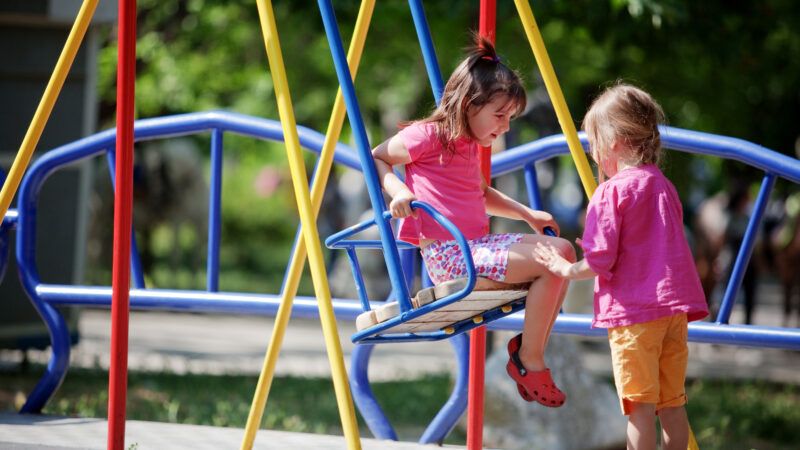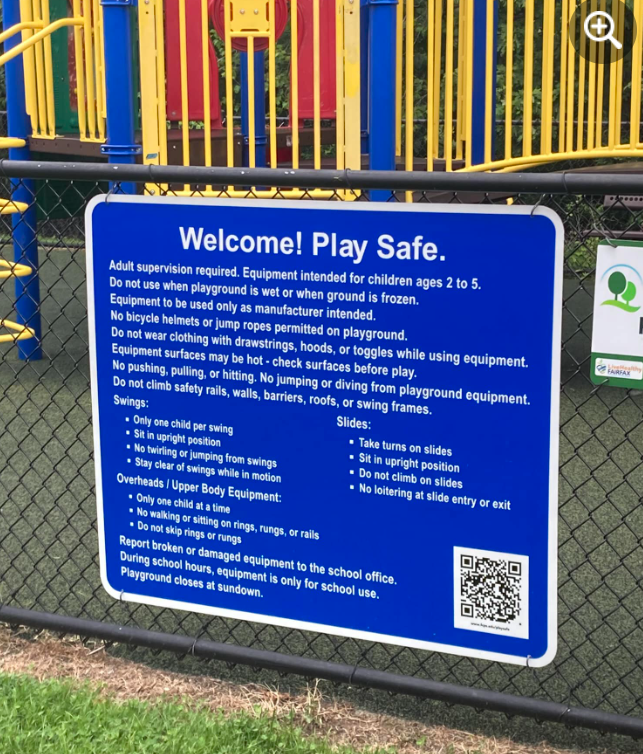Playground Sign Outlaws 'Loitering at Slide Entry or Exit'
"This is literally a playground that's for 2- to 5-year-olds," says former preschool teacher Katie Courtney.

"Welcome! Play Safe," reads the sign at a Fairfax County Public School playground in Virginia, just outside of Washington, D.C. The sign also lists a few simple rules—21 of them, by my count.
First off, the playground should never be used when it is frozen. Or wet.
There can be no climbing on things like the safety rails (which are basically just fences). Kids must not wear any clothing with drawstrings, hoods, or toggles while they are playing, because these items could get caught on something. (Ponytails seem grandmothered in.)
On the slide, children must "take turns," "sit in an upright position," and "not climb." There also must be "no loitering at slide entry or exit."
Loiter not, little ones!

"This is literally a playground that's for 2- to 5-year-olds," says Katie Courtney, a 32-year-old mom of four who brought the sign to my attention. The slide, she says, is "about as tall as an adult."
Nonetheless, when a child gets up to the top of the slide, legally they must hustle their butt right down. This irks Courtney, who has a master's degree in education and used to teach preschool.
"Part of the fun of being on the playground is that for three seconds you're at the top of the slide—you have one moment of being in charge," she says.
And if another kid is right behind you?
"How hard is it for a 4-year-old to negotiate, 'You need to move! You're blocking everyone else!'?" she wonders.
Without legal counsel? That's crazy.
Still, the slide rules pale in comparison to the rules for the monkey bars and rings. Kids are not allowed to sit or walk on the monkey bars, nor can they "skip rings or rungs."
Courtney finds this intolerable. If kids feel ready to skip a ring or rung, she says, they should be allowed to go for it.
"It gives them some confidence in their decision making," she says. Force kids to follow rules like that "and you think you're protecting your 4-year-old from getting hurt, then all of a sudden you have a 17-year-old who doesn't know how to make a decision."
Playing on the swings is also strictly regulated. The rules state there can be only one child at a time, they must "sit in an upright position," and there is to be no "twirling." Can they jump off? No, of course not.
Fairfax County did not respond to a request for comment about the sign.
Tony Christopher, executive director of the National Institute for Play, says that playgrounds post these signs in order to "mitigate the liability of the entity responsible for the playground (school, municipality, etc.) in the event they are sued."
Boston College psychology professor Peter Gray, an expert on free play and co-founder with me of Let Grow, has seen such signs at several playgrounds.
"The only restriction that needs to be added to make them complete is 'No Playing,'" he says.


Show Comments (211)